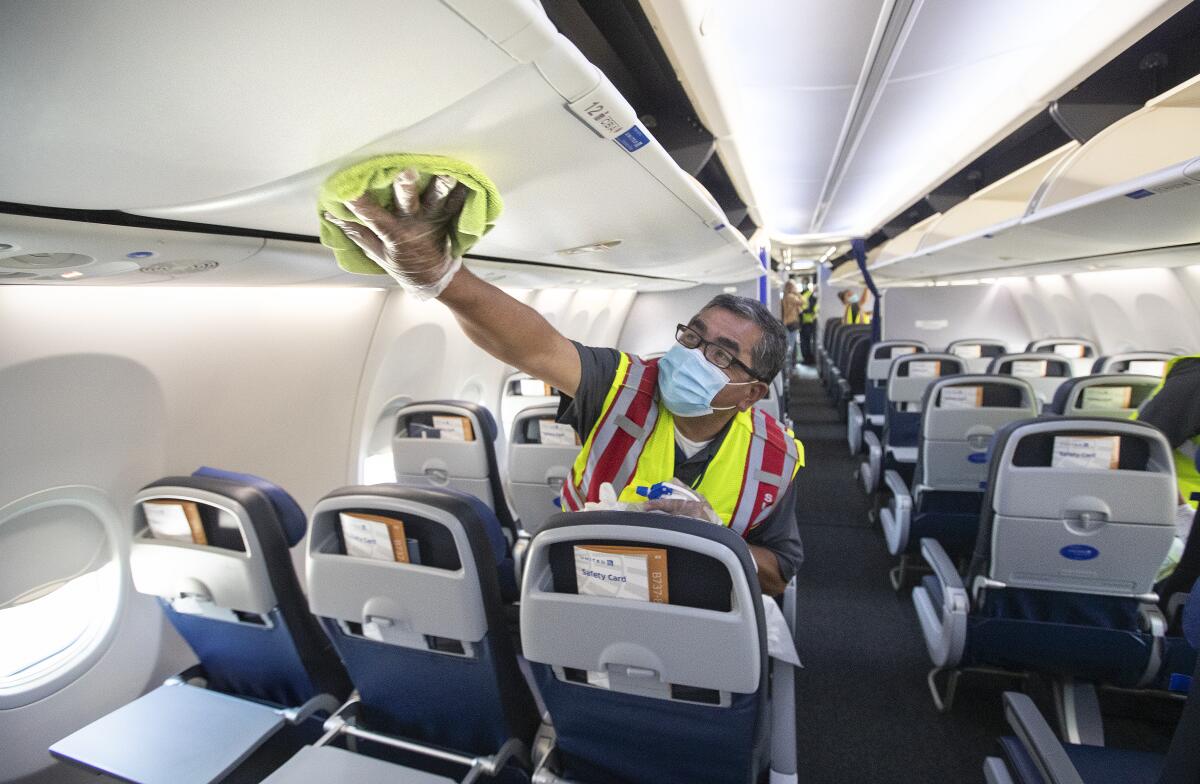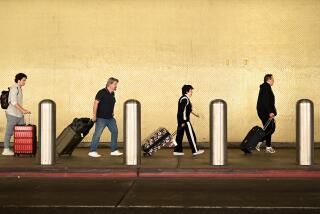Why you (and your germs) might not be welcome at this year’s Thanksgiving table

- Share via
Do you really need to risk your health, or someone else’s, for the satisfaction of a shared meal and the privilege of arguing politics with your wrongheaded cousins?
This is one of many questions wrapped up in the larger pro-con conversation about whether extended families should gather this year for the holidays.
The principal pro is clear: You and your kin will have the comfort of being together after a miserable year. That prospect will surely bring many families together in November and December, especially if they can drive rather than fly.
The big con, of course, is that you might infect one or more of your kin. Or they might infect you. Maybe your family has been lucky so far, but the U.S. death count passed 170,000 on Aug. 17, and that list is dominated by grandparents and great-grandparents.
There’s no way to know how the infection and death numbers will change over the next few months. But now isn’t too soon to look at the pros and cons of traveling to see family, especially if flying is involved.
Doing some research might help you manage expectations (if you’re against) or get better prices (if you’re in favor).
Get inspired to get away.
Explore California, the West and beyond with the weekly Escapes newsletter.
You may occasionally receive promotional content from the Los Angeles Times.
Begin with a few questions:
How necessary is this trip? How old is everyone involved and how healthy? How do infection and death rates compare between my area and my destination? Remember that California has more COVID-19 cases than anywhere else in the U.S., and L.A. County has more cases than any other California county.
One who probably won’t take a long-distance family trip this year is John DiScala, who runs the travel advice website JohnnyJet.com. DiScala, who lives in Manhattan Beach with his wife, Natalie; son, Jack, 4; and daughter, Olivia, 1, usually visits his father in Florida and his in-laws in Toronto. But now ….
“I want to go visit my dad, but he’s 92. And I can’t risk giving it to him,” DiScala said. “It’s torture.”
Also though DiScala has airline tickets to visit his in-laws in December, he’s expecting to cancel that trip too.
DiScala hasn’t boarded a flight since February — the longest he’s gone without flying in his adult life.
Why? Because DiScala has asthma and because he’s paying attention to infection and death statistics and listening to medical professionals.
“Right now, there are more cons than pros to flying,” he said. “The longer that we wait, the better the scientists and doctors can figure out what’s going on with this virus and how to treat it.”
Henry J. Ortiz, a psychologist in West Los Angeles, has come to a similar conclusion.
Ortiz and his fiancée had planned to fly to New York this winter to join her family. Now, he said, “we have begun some mourning about the fact that it’s unlikely that we’ll get to New York for the Christmas holidays.”
As things stand, that kind of vacation “for most of us is not a smart or moral thing to do right now,” Ortiz said. Yet, “the holidays are so meaningful for so many of us, it’s natural to have a lot of different emotions and excitement.”
Before anyone commits to a trip, Ortiz said, families should reexamine the way they communicate and how they handle changing circumstances.
“More than ever, we need to develop good communication skills,” Ortiz said. “We need to be open and honest with each other about what’s important and why that’s important.”
Rubén Hernández-León, a sociology professor at UCLA and director of the university’s Center for Mexican Studies, cited several major variables for Mexicans and Mexican Americans considering travel to Mexico for the holidays.
One unknown: The border, officially closed to nonessential land travel since March, may still be closed in November and December. Another: Some Mexicans and Mexican Americans may be nervous about recrossing into the U.S. under the Trump administration.
Meanwhile, Hernández-León said, many rural Mexican towns have already put out word that they’d rather not have visitors this year. That would mean less money in the community but could reduce the virus threat to aging parents.
“If things are more or less the way they are now, a lot of people will end up staying put,” Hernández-León said. “There are going to be a lot of phone calls, a lot of WhatsApp videos.”
In Hernández-León’s case? “I’m staying put. Usually either my parents come here [from Monterrey, in the Mexican state of Nuevo León] or I go there. And of course this is not going to happen this year.”
With California leading the country with more coronavirus cases than any other state, public health experts here urge people to postpone nonessential trips. Yet legions of airlines, hotels and Airbnb operations, desperate for revenue, are happy to welcome them.
This means travelers must decide for themselves. Here are more pros and cons.
Up in the air

Pro: The airfare might be cheap. Cheapair.com, which tracks fares for thousands of holiday-season flights, says 2020 holiday fares are tracking almost 25% lower than last year’s rates. Between April 12 and Aug. 12, Cheapair.com says, the average U.S. domestic holiday fare dropped to $277 from $356. Expedia has been listing December LAX-Newark, N.J., flights on United for as little as $148. (In any year, the Sundays after Thanksgiving and Christmas are two of the most expensive and crowded days to fly.)
Con: The federal government doesn’t require travelers to wear face coverings while flying.
Pro: All of the largest U.S. airlines require face coverings, and Delta, JetBlue and Southwest have pledged so far to keep middle seats empty unless a family wants to sit together.
Con: Of those three airlines, only Delta has promised to keep middle seats empty through the holidays. Also, if you’re flying, you can’t avoid the airport and the people in it.
Pro: Experts do say that big jets’ HEPA air-filter systems are very efficient, especially if airlines turn them on before passengers board (rather than waiting until just before takeoff). Boeing says its cabin air is exchanged every two to three minutes.
Con: The big variable on a plane is the people who sit near you or brush past you. For more on air quality aloft, check this post by MIT Medical and this non-peer-reviewed study by MIT professor Arnold Barnett. Barnett calculated the odds of contracting COVID-19 at 1 in 4,300 if you take a two-hour flight and sit in a sold-out economy section, or 1 in 7,700 if you take the same flight with middle seats empty.
Seeing family
Pro: Gathering the extended family sustains traditions and strengthens generational ties.
Con: If you make the trip and everyone keeps the social distance that experts recommend, you won’t be hugging or kissing. You won’t be eating elbow to elbow at a long, crowded table. You might not be visiting anyone’s home. Will a gathering like that feel like the reunion you crave? If you ignore the doctors’ advice and hug and kiss, what if somebody gets sick?
Con: This year’s holidays will come on the heels of a ferocious presidential election, in a time of such political polarization that even mask-wearing (or mask-scorning) starts debates. If politics sends your extended family into uneasy arguments or awkward silences, Ortiz said, the conflicts could be deeper and broader this year.
Even before gathering, he said, “some of us are going to be furious and some of us are going to be celebrating.”
Where to sleep?
Pro: If you sleep in a family bedroom, you’ll avoid all the comings and goings of a hotel or the potential surprises of an Airbnb or rental property.
Get The Wild newsletter.
The essential weekly guide to enjoying the outdoors in Southern California. Insider tips on the best of our beaches, trails, parks, deserts, forests and mountains.
You may occasionally receive promotional content from the Los Angeles Times.
Pro: Hotels have rushed to boost and brag about their sanitation efforts. And they probably will be far from full at the holidays, perhaps with reduced prices and loosened cancellation and rebooking policies. In many cases, hotels are more flexible about such changes than private rental or Airbnb hosts.
Con: Unless your family has a lot of room, you will probably sleep in a hotel, Airbnb or another rental option. The safety of each property depends in part on management policies (ask how many hours or days rooms remain empty between guests). Workers’ efforts, guest behavior and luck also play roles. Though many academics and travel industry veterans have said they view an Airbnb stay as less risky than a hotel visit — because guests are likely to encounter fewer people — neither is perfect.
Pro: You might cut your chance of exposure substantially if you can find a rental home in a thinly populated area. But “if you’re going to rent a place, you’d better get on it now,” DiScala said. He expects high demand for such locations, especially at the holidays, because “that’s what people want. They want to be away from people, and they don’t want to be in a hotel.”
Where to get the best information
•If you’re considering travel within California, the state Department of Public Health offers regular COVID-19 updates on its website, and The Times has a county-by-county virus tracker.
•If you’re thinking about travel out of state, consult the CDC for detailed U.S. statistics and guidance. Remember that many states have restrictions, including Hawaii (14-day self-quarantine requirement in place). Alaska, New York, New Jersey and Connecticut require 14-day quarantines for travelers from states (such California) with relatively high COVID-19 infection rates.
•If you’re considering a family trip overseas, check with the U.S. State Department and World Health Organization. Many countries, including the European Union, have banned Americans or imposed quarantine restrictions.
More to Read
Sign up for The Wild
We’ll help you find the best places to hike, bike and run, as well as the perfect silent spots for meditation and yoga.
You may occasionally receive promotional content from the Los Angeles Times.







